#About the global south or just Not Europe or the US
Note
Having seen anyone talk about it but I know you kept posting about Brazil's election; First, thanks and second, Elon is starting up rumors to call Brazil's election into question
I think you mixed me up with someone else. I posted about Sri Lanka's protests.
But it's true that he's saying that, and it's probably going to fuel the right-wing Trumpist-like cult around this indescribable prick, especially since he's already trying to challenge the election.
#but 'yaay musk killed twitter good riddance' right? who tf cares about the damage he can do with it to the rest of the world right?#only the US matters to y'all right? Global South what? Eastern Europe eh?#the west is morally compelled to assassinate this mfer actually#if moral compulsion was ever a thing in politics#just pretend he's a LatinAm leftist leader#easy-peasy#asks#anon#brazil#muskapocalypse#politics#knee of huss
3 notes
·
View notes
Note
I'm asking this genuinely, as a 19 yo with no education in economics and a pretty surface level understanding of socialism: can you explain the whole Bananas discourse in a way someone like me might understand? In my understanding it's just "This is just a product we can give up to create better worker conditions and that's fine" but apparently that's not the full picture?
alright so some pretty important background to all this is that we're all talking about the fact that bananas, grown in the global south, are available year-round at extremely low prices all around europe and the USA. it's not really about bananas per so--the banana in this discourse is a synechdoche for all the economic benefits of imperialism.
so how are cheap bananas a result of imperialism? first of all i want to tackle a common and v. silly counterargument: 'oh, these ridiculous communists think it's imperialist for produce to be shipped internationally'. nah. believing that this is the communist objection requires believing in a deeply naive view of international traide. this view goes something like 'well, if honduras has lots of bananas, and people in the usa want bananas and are willing to pay for them, surely everyone wins when the usa buys bananas!'.
there are of course two key errors here and they are both packed into 'honduras has lots of bananas'. for a start, although the bananas are grown in honduras, honduras doesn't really 'have' them, because the plantations are mostly owned by chiquita (formerly known as united fruit) dole, del monte, and other multinationals--when they're not, those multinationals will usually purchase the bananas from honduran growers and conduct the export themselves. and wouldn't you know it, it's those intervening middleman steps--export, import, and retail, where the vast majority of money is made off bananas! so in the process of a banana making its way from honduras to a 7/11, usamerican multinationals make money selling the bananas to usamerican importers who make money selling them to usamerican retailers who make money selling them to usamerican customers.
when chiquita sells a banana to be sold in walmart, a magic trick is being performed: a banana is disappearing from honduras, and yet somehow an american company is paying a second american company for it! this is economic imperialism, the usamerican multinational extracting resources from a nation while simultaneously pocketing the value of those resources.
why does the honduran government allow this? if selling bananas is such a bad deal for the nation, why do they continue to export millions of dollars of banans a year? well, obviously, there's the fact that if they didn't, they would face a coup. the united states is more than willing to intervene and cause mass death and war to protect the profits of its multinationals. but the second, more subtle thing keeping honduras bound to this ridiculously unbalanced relationship is the need for dollars. because the US dollar is the global reserve currency, and the de facto currency of international trade, exporting to the USA is a basic necessity for nations like honduras, guatemala, &c. why is the dollar the global reserve currency? because of usamerican military and economic hegemony, of course. imperialism built upon imperialism!
this is unequal exchange, the neoimperialist terms of international trade that make the 'global economy' a tool of siphoning value and resources from the global south to the imperial core. & this is the second flaw to unravel in 'honduras has a lot of bananas' -- honduras only 'has a lot of bananas' because this global economic hegemony has led to vast unsustainable monoculture banana plantations to dominate the agriculture of honduras. it's long-attested how monoculture growth is unsustainable because it destroys soil and leads to easily-wiped-out-by-infection plants.
so, bananas in the USA are cheap because:
the workers that grow them are barely paid, mistreated, prevented from unionizing, and sometimes murdered
the nations in which the bananas are grown accept brutally unfair trade and tariff terms with the USA because they desperately need a supply of US dollars and so have little position to negotiate
shipping is also much cheaper than it should be because sailors are chronically underpaid and often not paid at all or forced to pay to work (!)
bananas are cheap, in conclusion, because they're produced by underpaid and brutalized workers and then imported on extortionate and unfair terms.
so what, should we all give up bananas? no, and it's a sign of total lack of understanding of socialism as a global movement that all the pearl-clutching usamericans have latched onto the scary communists telling them to stop buying bananas. communism does not care about you as a consumer. individual consumptive choices are not a meaningful arena of political action. the socialist position is not "if there was a socialist reovlution in the usa, we would all stop eating bananas like good little boys", but rather, "if there's a socialist revolution in the countries where bananas are grown, then the availability of bananas in the usa is going to drop, and if you want to be an anti-imperialist in the imperial core you have to accept that".
(this is where the second argument i see about this, 'oh what are you catholic you want me to eat dirt like a monk?' reveals itself as a silly fucking solipsistic misunderstanding)
and again, let's note that the case of the banana can very easily be generalised out to coffee, chocolate, sugar, etc, and that it's not about individual consumptive habits, but about global economic systems. if you are donkey fucking kong and you eat 100 bananas a day i don't care and neither does anyone else. it's about trying to illustrate just one tiny mundane way in which economic imperialism makes the lives of people in the global north more convenient and simpler and so of course there is enormous pushback from people who attach moral value to this and therefore feel like the mean commies are personally calling them evil for eating a nutella or whatever which is frankly pretty tiring. Sad!
tldr: it is not imperialism when produce go on boat but it is imperialism when produce grown for dirt cheap by underpaid workers in a country with a devalued currency is then bought and exported and sold by usamerican companies creating huge amounts of economic value of which the nation in which the banana was grown, let alone the people who actually fucking grew it, don't see a cent -- and this is the engine behind the cheap, available-every-day-all-year-everywhere presence of bananas in the usa (and other places!)
8K notes
·
View notes
Text
Today's update post will be dedicated to the lawsuit that South Africa (SA) submitted to the International Court of Justice (ICJ, the UN's judicial arm), with the discussion held this coming Thursday. I first wrote about it here.
Why is SA suing Israel specifically for the crime of genocide, and not for the easier to prove ('coz it doesn't involve intent) charge of committing war crimes? Well, because Israel has signed the international convention for the prevention of genocide. It actually signed it pretty early on, in 1949. Just 4 years after the end of the Holocaust (it applies to Israel since 1951). What signing this convention means, is that even if Israel isn't committing a genocide, and SA knows it isn't, SA also knows the only way to drag Israel to the ICJ is to accuse it of this crime, so... surprise! SA did.
Curiously, it turns out that the Palestinian Authority (PA) has secretly been helping SA with filing this lawsuit (as reported on Jan 6, on Kan News, source in Hebrew). The PA has a right to sue Israel at the ICJ, but it might be using SA as a proxy, because it is afraid of being sued itself (it can, as an idea, be sued for financially supporting the genocidally motivated actions of Hamas, due to its "pay for slay" program, where the PA pays Palestinians salaries for their terrorist activities, and the pay is greater the more lethal the attack. Because yes, the PA will be paying salaries for the Oct 7 massacre, despite it being carried out by Hamas, the Palestinian Islamic Jihad and other terrorists), and I guess they think the best defense is an offense. Also, by having SA file the lawsuit for them, the PA is making sure another country will be drawing all of the fire for it, such as the condemnation from the US, calling the lawsuit "counterproductive" and "not based on facts," which was issued against SA, not against the PA.

Also, weirdly it seems that the issue of intent, which should make the lawsuit more difficult to prove, is actually what most of the case is based on!? The lawsuit is less about what Israel has been doing, and more about quotes from Israeli officials, that supposedly expose genocidal intent. Many of these quotes are presented in a misleading way, stuff like omitting that the quotes were clearly in reference to obliterating Hamas, presented them instead as if these Israeli officials were talking about obliterating the Palestinians.

So basically, SA is guilty of precisely the first point I was making in this post, conflating Hamas with the Palestinians, but only when it can be used to attack the Jewish state.
I watched an interesting panel held about this subject, and one legal expert said the right thing to do, would be for the ICJ to point out that SA is abusing the court for cynical political purposes, that its lawsuit doesn't meet the minimal requirements to be filed, making it very obvious that they're just weaponizing the court and abusing its power to hound Israel, and for this, the lawsuit should be thrown out immediately, without even getting to trial. Another participant, a former Israeli diplomat to the UN, said that yes, that's what should be done. But this lawsuit will allow the judges to rule on the most burning subject on the global agenda these days, so they won't throw the case out and condemn SA for filing this frivolous lawsuit.
Another panelist suggested that Israel should go on the offense, and point out at the ICJ, that by virtue of SA being financially supported and invested in by Iran, and thus unsurprisingly supporting the Islamist Iranian regime, which is the one that financed Hamas' activity (including the massacre of Oct 7, and the recently exposed attempts to target Jewish institutes in Europe), it's actually SA that is supporting the genocide of the Jews. I doubt this is the line of defense Israel will take, but it's an interesting point to keep in mind.
In conclusion, regarding what this false lawsuit really means:

SA's lawsuit basically seeks to rob the Jewish state of the right to defend its population against a genocidal threat. That is INSANE. It is, in practice, pro-genocide, and insane that it's even entertained.
(for all of my updates and ask replies regarding Israel, click here)
#israel#antisemitism#israeli#israel news#israel under attack#israel under fire#israelunderattack#terrorism#anti terrorism#hamas#antisemitic#antisemites#jews#jew#judaism#jumblr#frumblr#jewish#resources
426 notes
·
View notes
Note
Let me tell you being a former Christian this shit goes so much deeper than a lot of born Jews realize. The Christian worldview (specifically Calvinist/Puritan) seeping into and pervading all of modern leftism is honestly frightening. But also it's very funny.
They believe that there are Good people and Bad people, and that any mistake or lapse in judgment or instance of not being educated is a Mask Off moment, showing who is a member of the Elect and who is not. If you fuck up, that's not just a fuck up, it's Revealing. You are damned, were always damned, you were just good at hiding it, and now we know the truth and are doubly angry because not only are you evil, you lied about it. The only recourse is to shun you, and if that leads to your death, so be it. Anyone who's seen any micro celebrity get canceled saw this in action.
And the only way you can prove you're a member of the Elect is to operate as if you have nothing to hide. You have to loudly and proudly proclaim your righteousness. If you don't have anything to hide why would you be worried? Privacy is suspicious. You Must Speak on everything they deem important or else you obviously agree with the Bad People. There is no room for discussion or healthy debate. There are no loopholes or subclauses or other points of view to consider. You're with us or against us. If you don't constantly go around saying you're with us, you're probably secretly against us. The only way to convince your neighbors, whom you inherently distrust, that you're one of the Good Ones, is to perform righteousness, parrot righteous words. The only way to redeem yourself is by grandiose acts of self flagellation, perhaps being the right demographic, or by accusing others of Heresy.
The goal is not to bring good into the world, it's to recruit more people into the same thought patterns (that's kind of all Christian denominations though). Because if you can convince your community that you're one of the Elect, that means G-d preselected you for Heaven, and you're golden. No repercussions or consequences baby. The only material benefit for you is that you "get" to proclaim you're going to Heaven and everyone has to agree with you. If anyone doesn't they're probably going to Hell anyway. You're on the right side (of history), so why should you ever self reflect or grow? Why should you question anything? Why should nuance or empathy exist? This is about Right and Wrong. We know where we stand, where do you stand?
Every single aspect of American culture and politics, right and "left" alike, was planted by the pilgrims, and it is so fundamentally antithetical to true Leftist thought. Remember all the actually successful Western Leftist movements were started in Europe (and Israel cough cough)... because they kicked all their fucking psychotic Calvinists out. Those people went to America and that's a big big big reason why we don't have any near as much of a robust Leftist movement as even socially conservative European countries (and Israel cough cough). And what's funny is I still find myself slipping into these thought patterns, which is so not compatible with Jewish philosophy or theology. It's been years and I'm still not done.
It's a hell of a drug to kick, so I definitely don't trust white goysiche college kids who've been antitheists for about 6 months since they left their Republican parents' homes to have any great success in unlearning and unprogramming from this. Which is kind of obvious in that I see them acting just like their conservative Christian parents every day on every social media platform, swap out a gun toting white Jesus with some noble savage idea of Palestine, absolving the West of its sins against the Global South.
It is a cult structured around spiritual isolation, antisocial behavior, and it is inherently against any kind of political movement that centers and celebrates the Community. It is designed to tear communities apart and foster obedience to whatever authority can force itself on them. And this has been going on for almost 500 years, there is nothing we can do about it.
Thank you for the insightful look. Their "purity culture" approach definitely had to come from somewhere.
353 notes
·
View notes
Text
Did you Know
Mammal bias isn't the only one when it comes to researching nature and deep time?
There are more!
There is also time bias! As I have discussed with @quark-nova, Essentially, because the more recent something is the easier it is to learn about - more remains of things, more details from the rocks, etc. - we also have ridiculous amounts of bias towards more recent times. This is clearest when it comes to the traditional geologic time scale - the further back you go, the longer time periods are, and nothing is divided particularly evenly. I would even say the "anthropocene" is the biggest offender in this - if we zoomed out from today to a hundred million years ago, all of the extinctions and chaos of the past 2.5 million years would get lumped together into one big mass extinction, not separated out into nitty gritty and frankly narcissistic time slices.
Then there is geographical bias! You'd think people studying the whole biosphere wouldn't have this, but we do! Thanks to *colonialism!* The geologies of North America and Europe are significantly better studied than the rest of the world, which is fighting hard to catch up. This even extends to our knowledge of modern life, with many new species still being discovered in "the global south" (I personally prefer the term Gondwana, but what can you do). And we have no one to blame for that but ourselves.
And another one is land bias! Because we are land organisms, we tend to think about land ecosystems more than oceanic ones - in fact, the ocean only really gets enough time on it in the early stages of life, everything before the Silurian, because there isn't a land ecosystem to focus on more! But the oceans are just as influential in our past - honestly, moreso - than land ecosystems, even today - think about how much El Niño affects us all! But how many people know about the end cretaceous extinction, and not the mesozoic marine revolution? How many people know that reefs at the end Cretaceous were just, made by bivalves for some reason? The list goes on.
Then there's the one most people know about already - megafaunal and charismatic bias! This often goes hand in hand with mammal bias, but essentially, because we ourselves are megafauna - I know we specifically define megafauna to exclude humans, but how the hell is that logical - we operate on a big scale, at any rate - we tend to favor megafauna in our knowledge of the past and our understanding of life. And, if its not megafauna, it at least has to be charismatic - cute, extra weird maybe, or familiar. This affects modern research so much, especially conservation and research funding - not just paleo, but also neontological work. Charismatic Megafauna get everything, and everyone else gets scraps.
This is just the tip of the iceberg! All scientists bring in bias - that's why we need as many scientists as possible, so we have as many perspectives as possible to come up with the most parsimonious and universal view of nature - but some biases are fairly universal for humans and need to be murdered in our heads by all of us. Why did Wingspan and Holotype both start with North America when the best birds are in South America and the best fossil dinosaurs are in Asia? The list is infinite.
The biases we have because of the way history has played out, the way preservation works, and because of what kind of organisms we are as humans, are ones we all have to work to disassemble and deconstruct in our brains. The more we do so, the more we can look at the big picture, understand our entire biosphere, and work together to protect it.
Plus, imagine how much cool stuff we'll learn about when we finally take the time to do so.
We have nothing to lose but our chains.
306 notes
·
View notes
Text

Why These Imperfect Korean ‘Moon Jars’ Sell for Millions
Old, round, imperfect and beautiful — that’s how fans of Korean art describe the moon jar, or “dalhangari.”
These unassuming, plain white pots have entranced everyone from rapper RM, of K-pop sensation BTS, to philosopher Alain de Botton.
The former director of London’s Victoria and Albert Museum, Beth McKillop, has called the moon jar an “icon of Korean identity.” And if price is any indicator of popularity, one recently sold for over $4.5 million at a Christie’s auction.
This month, a rare example from the late 17th or early 18th century will go on sale at Sotheby’s in New York, where it’s expected to fetch more than $3 million.
“A large moon jar has always been expensive, but I think the big uptick in prices and value is… because their appeal is now global,” said Angela McAteer, Sotheby’s international head of Chinese art for the Americas and Europe, over video call. “You’ve got an international cohort of bidders competing for them, so it’s gone beyond the traditional connoisseur collecting community of Korean art.”
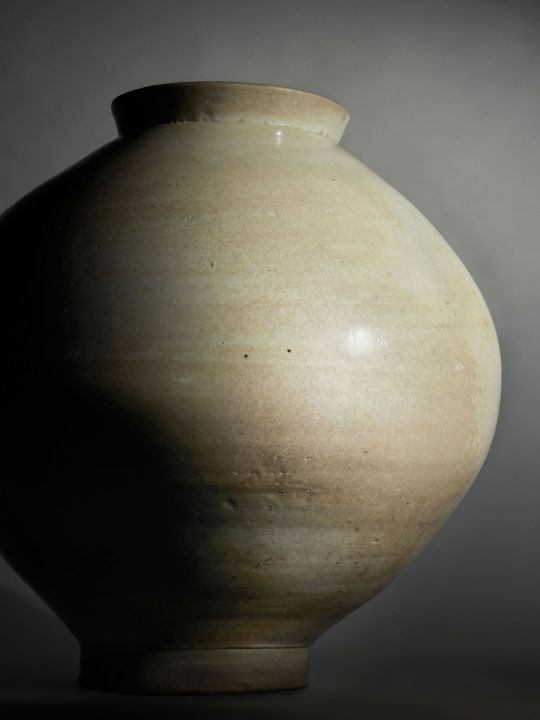
Huge price tags also result from the jars’ rarity. Although made for over a century in the royal kilns of Korea’s last kingdom, the Joseon dynasty, few are thought to exist today. Estimates for the number of larger ones (those more than 40 centimeters, or 15.7 inches, tall and wide) that have survived over the years range from 12 to 30.
Having passed through auction houses and antique dealers across the world, several of these are now in the collections of institutions like the British Museum and Boston’s Museum of Fine Arts, as well as in the hands of private collectors.
‘Owning a piece of happiness’
The first moon jars were created in the royal kilns in Gwangju (a city just outside Seoul, not the larger southern city of the same name) from 1650 to 1750. They were made from pure white porcelain and kaolin clay, and, following the neo-Confucian fashions of their day, the pots reflected values such as propriety, humility, frugality and purity. They were likely used at court and in upper-class homes as containers for food and liquids, or as decorative vessels.
In the mid-20th century, moon jars began gaining international appreciation thanks to influential admirers such as Japanese folk crafts scholar Yanagi Soetsu and British potter Bernard Leach, who bought one from a Seoul antique store in 1935. Leach once said that having a moon jar was like “owning a piece of happiness,” and would later give his to fellow potter Lucie Rie for safekeeping during World War II. It stayed in her studio until her death and was later acquired by the British Museum.
Charlotte Horlyck, lecturer in Korean Art History at the University of London’s School of Oriental and African Studies, wrote in the Art Bulletin journal that after World War II the moon jar “caught the attention of an early generation of postcolonial Korean artists and scholars who sought to restore Korean art history and national identity,” as the pieces “resonated with the visual language of international modernism and minimalism of the mid-20th century while remaining a distinctly Korean work of art.”
The moon jar’s allure
When Sotheby’s announced its forthcoming sale, the auction house described its 44-centimeter (17.3-inch) moon jar as an object that inspired, astounded and soothed those who “stand in its presence.” It’s a funny thing to say about a pot, to speak as if it’s alive, but the jars’ visceral, emotional impact on people is something that comes up time and time again in the literature.

Choi Sunu, a former director of the National Museum of Korea, has described the museum’s moon jars as being like companions, or muses that have inspired his writing and stirred his creativity. Bernard Leach admired the pots for their “natural unselfconsciousness.” In 2012, South Korea’s then-Unification Minister Yu Woo-ik used the pot as a metaphor symbolizing a reunified Korean peninsula (moon jars are created in two hemispherical pieces and joined in the middle).
More recently the rapper RM, of K-pop group BTS, posted a picture of himself hugging a modern-day moon jar on Twitter, telling fans that the pots made him feel calm.
“It’s hard for someone to really comprehend how a pot can make you feel that way,” said McAteer. “It has this real meditative presence. If you’ve sat in front of a great (painting by US artist, Mark) Rothko and you feel this kind of palpable energy emanate from it, and you could sit for hours and just feel something in its presence — the moon jar has that too.”
“The more you look at it, the more there is to see. It looks different from every angle,” she added. “We had real issues with the photography and the catalog because it looks like a different piece every time you rotate it, or you change the lighting. The surface is just alive, you know.”
“You can see how the glaze coalesces; you see these spontaneous bursts of this blush color that’s happening in the firing. You can lose yourself in its surface.”
Modern masters
Modern Korean potters have been inspired by the jars, and a number have come up with their own homages. Ceramist Kim Syyong covers his pots with a black glaze, while Yun Ju Cheol’s versions look spikier like a pufferfish and Choi Bo Ram’s unvarnished, textured blue vases have a denim-like quality.
Others, like Kwon Dae Sup, have looked to closely recreate the process used by the potters of yore. The 71-year-old ceramist produces unadorned white jars and allows for all the beautiful imperfections produced to shine through. He works out of a studio in Gwangju, where the royal kilns that produced moon jars were once located.



There’s a great deal of preparation that goes into making a moon jar traditionally. It’s labor-intensive: washing, sifting impurities from the clay, kneading and rolling it to remove air bubbles, carrying around these large hunks, not to mention hand throwing the clay itself to that oversized bowl shape without collapsing, and the work keeping a pine wood fire burning for 24 hours while the pot hardens in the kiln. Kwon also built his own kiln to replicate the old process as closely as possible.
“I do this because it’s fun,” he said in a phone interview. “Every time I make something, it’s novel … The quality of the material is different every time. The conditions in which I make the pots is new every time.”
Kwon said he also feels an emotional connection to the moon jar. As a student he was so moved by a one he saw in a Korean antique store that he decided they would be his life’s work. “They feel alive,” he said.
In a 2019 book on his work by Axel Vervoodt Gallery the potter is quoted saying he tries to produce art that needs no addition or subtraction. “I wish to create work that has an imposing presence but harmonizes with its surroundings regardless of where and when it is displayed. It should give peace of mind and a sense of comfort to all who look at it.”
By Christy Choi.

#Moon Jars#Why These Imperfect Korean ‘Moon Jars’ Sell for Millions#Dalhangari#Joseon dynasty#pottery#porcelain#Bernard Leach#Lucie Rie#Kwon Dae Sup#ancient artifacts#archeology#archeolgst#history#history news#ancient history#ancient culture#ancient civilizations#korean history#korean art#art#artist#art work#art world#art news#long reads
127 notes
·
View notes
Text
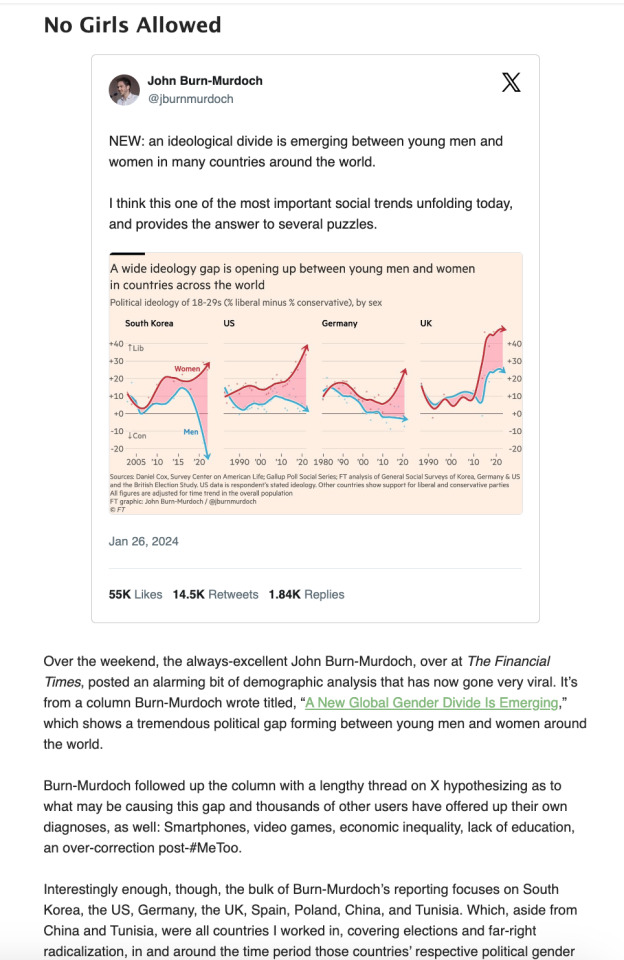
Most mar a garbage day is megirta (egybol ossze is omlott a site)
Over the weekend, the always-excellent John Burn-Murdoch, over at The Financial Times, posted an alarming bit of demographic analysis that has now gone very viral. It’s from a column Burn-Murdoch wrote titled, “A New Global Gender Divide Is Emerging,” which shows a tremendous political gap forming between young men and women around the world.
Burn-Murdoch followed up the column with a lengthy thread on X hypothesizing as to what may be causing this gap and thousands of other users have offered up their own diagnoses, as well: Smartphones, video games, economic inequality, lack of education, an over-correction post-#MeToo.
Interestingly enough, though, the bulk of Burn-Murdoch’s reporting focuses on South Korea, the US, Germany, the UK, Spain, Poland, China, and Tunisia. Which, aside from China and Tunisia, were all countries I worked in, covering elections and far-right radicalization, in and around the time period those countries’ respective political gender gaps began widening. I’m not saying I have a tremendously in-depth understanding of, say, Polish toxic masculinity, but I did spend several days there following around white nationalist rappers and Catholic fundamentalist football fans. And, in South Korea, I worked on a project about radical feminists and their activism against the country’s equivalent of 4chan, Ilbe Storehouse.
In fact, between 2015-2019, I visited over 20 countries, essentially asking the same question: Where do bad men here hangout online? Which has given me a near-encyclopedic directory in my head, unfortunately, of international 4chan knock-offs. In Spain, it’s a car forum that doxxes rape victims called ForoCoches. In France, it’s a gaming forum that organized rallies for Marine Le Pen called Jeux Video. In Japan, it’s 2channel. In Brazil, it’s Dogolachan. And most, if not all, of these spaces pre-date any sort of modern social movement like #MeToo — or even the invention of the smartphone.
But the mainstream acceptance of the culture from these sites is new. Though I don’t actually think the mystery of “why now?” is that much of a mystery. While working in Europe, I came to understand that these sites and their culture war campaigns like Gamergate were a sort of emerging form of digital hooliganism. Nothing they were doing was new, but their understanding how to network online was novel. And in places like the UK, it actually became more and more common in the late-2010s to see Pepe the Frog cosplayers marching alongside far-right football clubs. In the US, we don’t have the same sports culture, but the end result has been the same. The nerds and the jocks eventually aligned in the streets. The anime nazis were simply early adopters and the tough guys with guns and zip ties just needed time to adapt to new technology. And, unlike the pre-internet age, unmoderated large social platforms give them an infinitely-scalable recruitment radius. They don’t have to hide in backrooms anymore.
Much of the digital playbook fueling this recruitment for our new(ish) international masculinist movement was created by ISIS, the true early adopters for this sort of thing. Though it took about a decade for the West to really embrace it. But nowadays, it is not uncommon to see trad accounts sharing memes about “motherhood,” that are pretty much identical to the Disney Princess photoshops ISIS brides would post on Tumblr to advertise their new life in Syria. And, even more darkly, just this week, a Trump supporter in Pennsylvania beheaded his father and uploaded it to YouTube, in a video where he ranted about the woke left and President Biden. Online extremism is a flat circle.
The biggest similarity, though, is in what I can cultural encoding. For ISIS, this was about constantly labeling everything that threatened their influence as a symptom of the decadent, secular West.
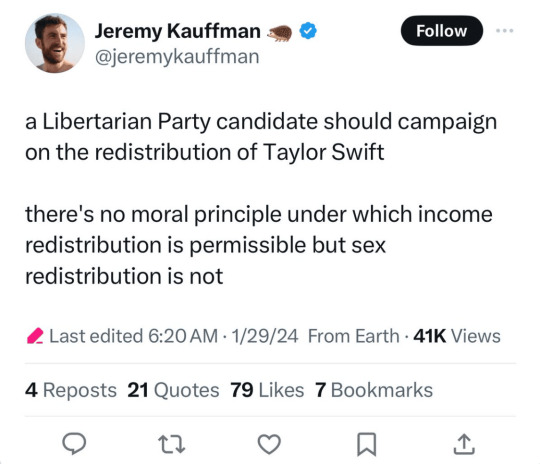
(X.com/jeremykauffman)
Taylor Swift, an extremely affluent blonde, blue-eyed white woman who writes country-inflected pop music and is dating a football player headed for the Super Bowl. She should be a resounding victory for these guys. Doesn’t get more American than that. But due to an actually very funny glitch in how they see the world, she’s actually a huge threat.
Pop culture, according to the right wing, should be frivolous. Because before the internet, it was something sold to girls by corporations run by powerful men. Famous pop stars through the ages, like Frank Sinatra, America’s first Justin Bieber, or The Beatles, the One Direction of their time, would be canonized as Great by Serious Men after history had forgotten they rocketed to success as their generation’s Tumblr Sexymen. But from the 2000s onward, thanks to an increasingly powerful digital public square, young women and people of color were able to have more influence in mainstream culture and also accumulate more financial power from it. And after Barack Obama’s 2008 presidential campaign was able to connect this new form of pop influence to both liberal progressive politics and, also, social media, well, conservatives realized they had to catch up and fast. And the fastest way to do that is to try and smash the whole thing by dismissing it as feminine.
Pop music? It’s for girls. Social media? It’s for girls. Democrats? Girls. Taylor Swift? Girls and also a government psyop. But this line of thinking has no limit. It poisons everything. If Swift manages to make it to the Super Bowl, well, that has to become feminine too. And at a certain point, the whole thing falls apart because, honestly, you just sound like an insane loser.
39 notes
·
View notes
Text
The Ancient and Medieval American Mississippian culture 500-1500 AD
Going down a deep dive of the Mississippian mound culture of precolumbian United States.
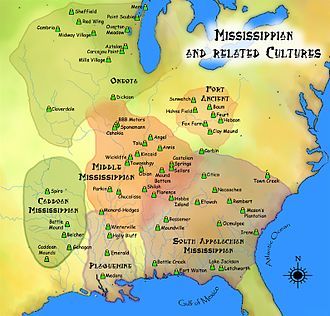
I knew some stuff about the topic, pretty basic and precursory information, but now I think I'm gonna do some more in depth research. It's just fascinating to learn how throughout the Mississippi river region and deep south there were large cities that rivaled medieval cities in Europe with populations in the tens of thousands. Cahokia Illinois for example.


And they made all kinds of really cool artifacts
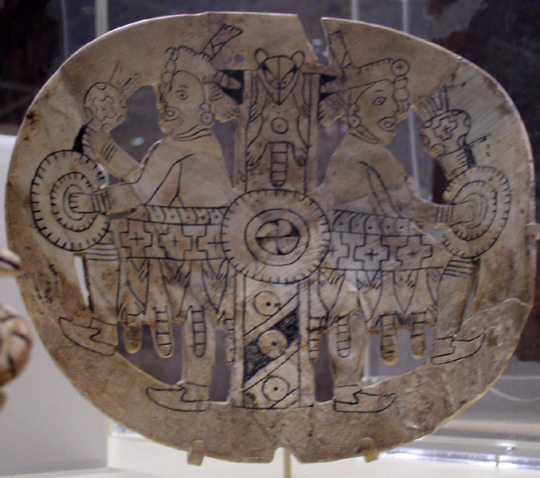
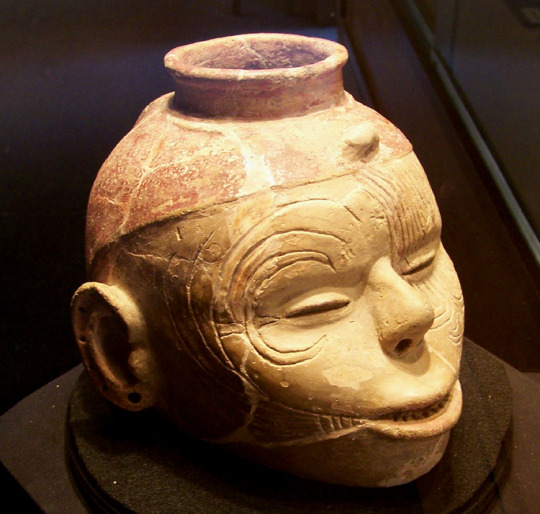
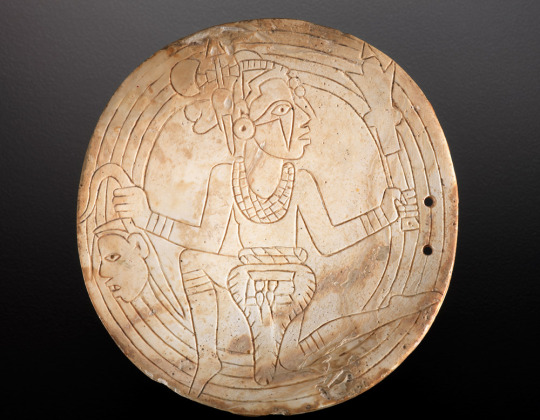
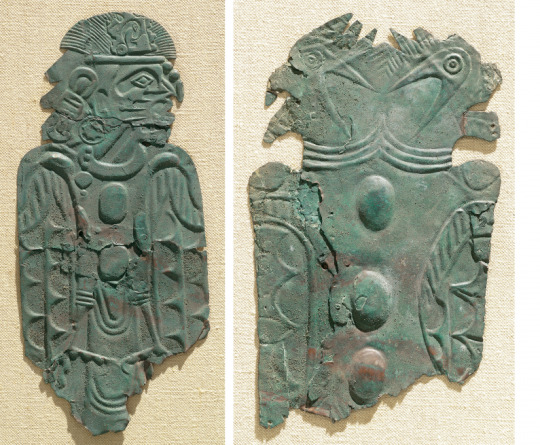
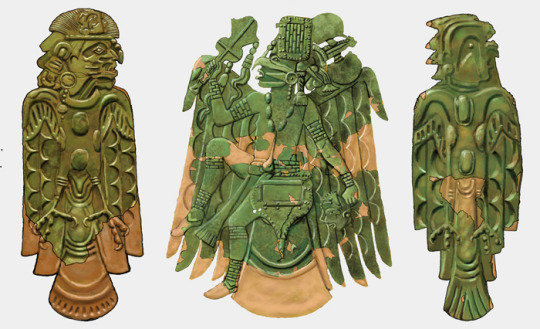
They had trade routes all over North America. For example copper from the Great Lakes region, shells from the Atlantic and Gulf Coast, and Obsidian from Mexico. In addition their own goods have been found exported to archaeological sites all over North America.
Then around the 14th century the Little Ice Age started, which was basically a sudden drop in global temperatures lasting until the mid 19th century, which resulted in crop failures and famine worldwide. In addition large populations were already stretching the food resources and agriculture of the area. This resulted in the decline of urban culture among the Mississippians. At the time in Eurasia the same was happening, which helped bring about the Black Death. So there were hard times all around. The 14th century was a bad time to be alive almost everywhere. Final collapse occurred in the 16th century when smallpox swept through the Americas after European contact.
Unfortunately for us they had no system of writing, at least none that can be found. So we will probably never know their story and history as well as say the ancient Romans. All that we know is pieced together through archaeological findings and oral history of their modern descendants.
Anyway I'm gonna find some good audiobooks to listen to on the subject while I do my weightlifting.
343 notes
·
View notes
Text
Is Lula Anti-American? It's complicated.

It’s the question in Washington that won’t go away: “Is Lula anti-American?” Since returning to Brazil’s presidency on January 1, Luiz Inácio Lula da Silva has repeatedly caused alarm in the U.S. capital and elsewhere with his comments on Ukraine, Venezuela, the dollar and other key issues. An unconfirmed GloboNews report in June said President Joe Biden may have abandoned any intentions of visiting Brasilia before the end of the year because of frustration with Lula’s positions.
The question causes many to roll their eyes, and with good reason. Three decades after the end of the Cold War, some in the United States continue to see Latin America in “You’re either with us or against us” terms. Washington has a long record of getting upset with Brazil’s independent stances on everything from generic AIDS drugs in the 1990s to trade negotiations in the 2000s and the Edward Snowden affair in the 2010s. A large Latin American country confidently operating in its own national interest, neither allied with nor totally against the United States, simply does not compute for some in Washington, and maybe it never will.
That said, there is a long list of reasonable people in places like the White House and State Department, in think tanks and in the business world who are perfectly capable of understanding nuance — and have still perceived a threat from Lula’s foreign policy in this, his third term. The list of perceived transgressions is long and growing: Lula has repeatedly echoed Russian positions on Ukraine, saying both countries share equal responsibility for the war. In April, Lula said blame for continued hostilities laid “above all” with countries who are providing arms—a slap at the United States and Europe, delivered while on a trip to China, no less. Lula has worked to revive the defunct UNASUR bloc, whose explicit purpose was to counter U.S. influence in South America. He has repeatedly urged countries to shun the U.S. dollar as a mechanism for trade when possible, voicing support for new alternatives including a common currency with Argentina or its other neighbors. Lula has been bitterly critical of U.S. sanctions against Venezuela–”worse than a war,” he has said—while downplaying the repression, torture and other human rights abuses committed by the dictatorship itself.
For some observers, the inescapable conclusion is that Lula’s foreign policy is not neutral or “non-aligned,” but overtly friendly to Russia and China and hostile to the United States. This has been a particular letdown for many in the Democratic Party who briefly saw Lula as a hero of democracy and natural ally after he, too, defeated an authoritarian, election-denying menace on the far right. And for the record, it’s not just Americans who feel this way: the left-leaning French newspaper Liberation, in a front-page editorial prior to Lula’s visit to Paris in June, called him a “faux friend” of the West.
To paraphrase the old saying, it’s impossible to know what truly lurks in the hearts of men. But as someone who has tried to understand Lula for the past 20 years, with admittedly mixed results, let me give my best evaluation of what’s really happening: Lula may not be anti-U.S. in the traditional sense, but he is definitely anti-U.S. hegemony, and he is more willing than before to do something about it.
That is, Lula and his foreign policy team do not wish ill on Washington in the way that Nicolás Maduro or Vladimir Putin do, and in fact they see the United States as a critical partner on issues like climate change, energy and infrastructure investment. But they also believe the U.S.-led global order of the last 30 years has on balance not been good for Brazil or, indeed, the planet as a whole. They are convinced the world is headed toward a new, more equitable “multipolar” era in which, instead of one country at the head of the table, there will be, say, eight countries seated at a round table—and Brazil will be one of them, along with China, India and others from the ascendant Global South. Meanwhile, Lula has lost some of the inhibitions and brakes that held him back a bit during his 2003-10 presidency, and he is actively out there trying to usher the world along to this promising new phase—with an evident enthusiasm and militancy that bothers many in the West, and understandably so.
Continue reading.
124 notes
·
View notes
Text
The global market for carbon offsets is worth about $2 billion today and projected to grow to as much as $1 trillion in 15 years even as it faces fundamental questions about credibility and effectiveness. Add government appropriation to the list of risks for this climate solution.
A shock announcement this week that Zimbabwe will take half of all revenues generated from offsets projects developed on its territory is a harbinger of an uncertain future in the carbon trade. The African nation is the world’s 12th largest creator of offsets, with 4.2 million credits from 30 registered projects last year, according to BloombergNEF.
Zimbabwe’s move gives the government control of carbon credit production and cancels all past agreements with international organizations. That means more revenue generated from credits tied to protecting forests and other efforts to cut emissions will flow into national coffers rather than going to project developers.
There’s now risk that other countries might follow suit, creating new uncertainties for businesses that develop and sell offsets, corporations that purchase offsets as a way to counterbalance their greenhouse gas pollution and the cohort of traders who invest in this emerging asset class. [...]
The move “blindsided” CO2balance, a company that runs five carbon offset projects in Zimbabwe. “Everyone knew changes were happening but we weren’t expecting this — it wasn’t on the horizon,” said Paul Chiplen, head of sales, in an interview on Thursday. “It does put a question mark in investors’ minds when you’re not quite sure of what level of return you’re getting.” [...]
“I think it is an entirely understandable thing for Zimbabwe to want to take a proportion of the funds from any exports of carbon from its territory,” said Edward Hanrahan, director at carbon project developer Climate Impact Partners. “But the issue is they acted rapidly and without prior notice.”[...]
Each credit represents one ton of carbon dioxide and can be bought and sold many times before being used. The unregulated structure of the market involving companies, traders and governments creates risk of double counting. What if a government seeks to benefit by trading a credit produced in its territory after its been sold to an investor or used in a corporate sustainability plan?[...]
Treating carbon credits as just another export commodity underscores an imbalance at the heart of this global trade: Efforts to develop credits are usually funded by firms from wealthy countries and sold to corporate buyers in Europe and the US, yet most of the projects are located in emerging economies. This setup has been derided as a form of carbon colonialism that strips developing countries of an increasingly valuable resource.
“Rushing to frame the decision by Zimbabwe as ‘nationalization risk’ exposes a sense of entitlement to access those resources by the global North,” said Rich Gilmore, chief executive officer at investment manager Carbon Growth Partners in Melbourne. “We need to acknowledge that the past 200 years of resource extraction have miserably failed people and the planet. And if we want the carbon market to scale, we need to respect the right of the nations of the south to determine their own rules.”[...]
Developers and investors might start to prioritize countries where governments have been transparent about their future carbon policies. Plus, if governments follow Zimbabwe in taking half of the project revenues, that will create a barrier to carbon projects that are the most costly to implement.[...]
It’s “entirely appropriate” for countries to seek a larger share from their carbon resources but they must “carefully consider the economics,” said Martijn Wilder, chief executive officer of Pollination, a climate advisory and investment firm. “If what’s left for a project developer is not sufficient to cover an investible rate of return, the project simply won’t happen.”
21 May 23
117 notes
·
View notes
Note
The slur topic is a bit weird tbh, not because people are annoyed about certain terms sounding like or being alike, but because it forgets that certain slurs are particular to a specific place, and not everyone is going to know or even care to research because it has no relevance to them, or is even something that pertains to their social experience.
Expecting everyone to adhere to specific rule of not using what is a "slur" in one place probably won't work, because of how different the understanding of language and personal social politics are. If a term has absolutely zero relevance where you live, and it's already tied to a different meaning a/b/o as a term for omegaverse, how should they ever connect the dots, or care to find out that someone from a different culture also uses that words as a slur? Why is a completely unrelated person suddenly guilty of the insults and slurs perpetuated by people of a different culture?
And even just the awareness of it or the mind of it. Will people who ask this also respect not using slurs and terms of insults from other cultures? Or is this a thing only expected of people when it comes to anglospheric racially/sexuality/indentity charged insults and slurs?
How many people think "colored" is an insult or a slur?
In South Africa it's a description for, I quote "multiracial ethnic communities".
The other name for the makrut lime, "kefir/kafir/kaffir/cafri" is considered a racial slur against black people in South Africa, yet it's still readily and openly used in recipes, videos, food guides. It also originated in Islam and was used against non-believers.
Oriental has a big negative history in the West, and is considered a negative term, and degrading. Yet you can easily find a lot of Asian stores that use that specific term or tag to refer to items produced and sold in the global market.
I think a big one is also for other Spanish speakers that the word "negro" for the color black is constantly being pointed at as a slur by people not speaking Spanish, but as a Spanish speaker myself it's literally just a color. Crayola could sing a song about the misunderstandings about their multi lingual labelling of their crayons.
I remember a person from the West having a giant tantrum about an online stores url, "BiginJap" ranting about the fact that the "Jap" part, even though the store using it Big in Japan, is a literal japanese store, from Japan, selling Japanese products.
Gypsie is considered a slur across a lot of Europe, if not most of it, I still see people argue that because "it's fine here in the US" they don't have to care about it and can just use it, even if they're not part of that group. Who's in the right here? The Roma and Sinti people or Europe? Or the people using the term in the US?
I am not saying you can't criticize the use of these words, but I'm saying that to in a way or some form to consider the intent when they're used. To assume the worst, especially when the person does not share your culture, language, or awareness of your culture shows a degree of ignorance and personal cultural-centrism that just won't work on a global scale. You can say "this is a slur where I am" but whatever that means to anyone not part of your culture, is up to them by the end of the day, especially when it's meaning can wary so much.
--
No, in general, nobody expects anyone to care about anything to do with Australia. That's partly why people are irritated about this one: the difference between what everyone is expected to know about the US vs. Australia.
41 notes
·
View notes
Note
re EE being in the periphery. i’m pretty sure there were articles about how germany uses EE countries in EU for cheap labor. like sure, they’re privileged compared to most say african states, but it’s not like WE countries give that privilege for free or out of good heart, when in reality it’s geographic control + cheap labor + brain drain. combined with the fact that EU doesn’t allow for state control of markets, it means that those EE countries that had state enterprises are now in disadvantage. like i think EE countries have more in common with latin american countries than western europe , idk.
yeah, and not only articles you can find in english, but there are actual studies and articles; they are however in croatian so i dont know how much help would that be (the emmigration issue here is huge, its mainly to germany/ireland) (we have so many SONGS about moving to germany and ireland too). heres wikipedia on it, i guess you can use google translate and it also lists something quite shocking: many cities and villages in croatia and bosnia have more people living in germany than in their respective native towns.
as for lived experience, when i visited germany, you could literally walk around the city and find our people there, mostly in low-skill jobs. i once said "u pičku materinu" and a totally random guy in the street was like "ooooo pa evo i naših". "arbajt" and "bauštela" are such common phrases here that they have become memes, and dalmatians from zagora literally wear mercedes signs around their necks. recently there was an article saying how, despite euro, people from imotski STILL mourn over the deutsch marke, because they used to go work there, and then would come home and just live for an entire month off one bill. they STILL convert euros to marke.
EE is a neo-colony to the WE. whenever i talk about this, while i do use EE as a term because its more understood than SEE (southern-eastern europe), my experiences are yugoslavian, and there are big differences between eastern bloc and exyu countries. it isnt the same, economically nor politically, since yugoslavia was a part of the third world movement, thus primarily working with african and latam countries in its past (also reason why we have the lowest skin-based-racism in europe)(different than nationality racism, thats what we excel at).
a lot of croats (esp dalmatians) mainly moved to latam countries during ww2 as opposed to the usa (the current chilean and argentinian presidents are croatian dalmatians)(sorry guys we are kinda ruining yalls countries)
it was very surprising to me when i started following global-south-commies on here, they always have very positive opinions of yugoslav countries. i find it very endearing how all my political yugoslav posts end up being hits among them.
politics unrelated, croats tend to love latam countries because of football, messi was literally the coolest person in the entire world while i was a kid. there are lots of similarities in mentality.
26 notes
·
View notes
Text
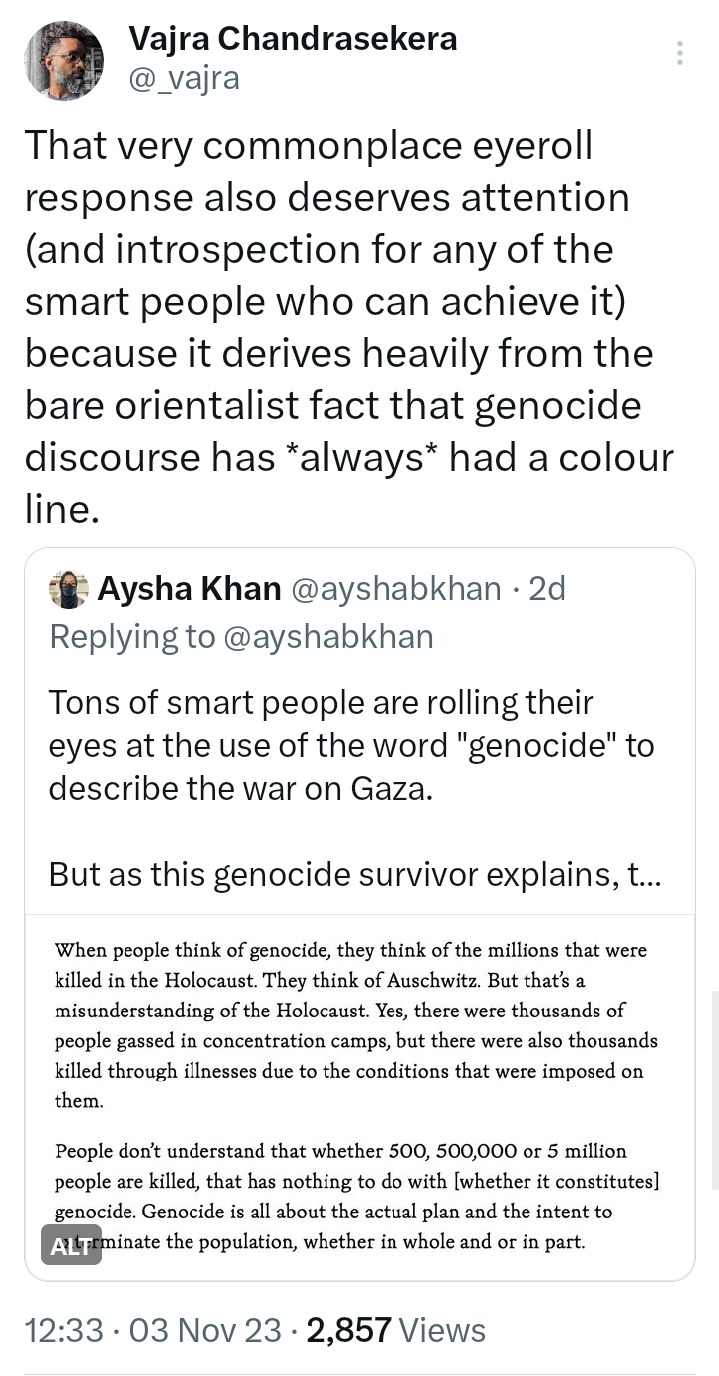

Please note that who gets to be "white" is contextual to the center of ethnic power in each region.
Dark-skinned people of Asian, African and Indigenous descent will never be white in any part of the world and will always be vulnerable to white skinned people of European descent. (Excepting the times Japanese and some East Asian peoples with an adequate lack of melanin have been granted conditional whiteness.)
However, Slavs, white Jews, white Latinos, white Roma (white skinned and associated with European origins) are fully white in places where they hold ethnosupremacy and achieve/are granted conditional whiteness of varying levels and privileges in the US, Canada, South Africa and other white settler colonies, and some parts of Europe (Jewish South African settlers had no idea what side of the apartheid fence they would fall until the white Afrikaners made clear they were accepted).
Whiteness in the Western world is also entirely in the purview of the imperial core's narrative. In the Western lens, Eastern Europeans eternally hover between the fact of being white-skinned Europeans and being Orientalised due to their histories as colonies of Russia and Ottoman empire and their shared heritage with Asia Minor. Even the narratives of the Holocaust erase the genocide of Soviet Jewry. (That's right, in Soviet Russia the Holocaust had nothing to do with Jews, which is why Putin keeps accusing Zelensky of being a Nazi). The US and Western Europe's manufacturing of consent for NATO's military alliance with Ukraine at the outbreak of its war with Russia involved efforts to elevate them to full whiteness that were routinely hilarious because demystifying and de-exoticising them (is that a word?) revealed the extent to which they had been Othered, paternalised and exotified (lots of "omg they're humans just like us even though they live in a shitty second world country" stories especially from the UK, ntm journalists parachuting in and seemingly being surprised they had McDonald's and internet access. You could not make this stuff up). You can contrast this directly with how much of a shit they don't give about Armenians because they're Russian allies, even though Armenians are literally white in the US. It's why I have to roll my eyes at the "they care about Ukrainians because they're white" discourse. That's entirely backwards— Ukrainians are white because NATO is invested in them. Otherwise they'd just be another former Soviet Republic up to their usual "savage shenanigans" like the rest of the Eastern Bloc.
You'd think you couldn't pull this same trick with non-Europeans, except that Apartheid South Africa deemed Japanese "honorary whites" (much like Nazi Germany proclaimed them honorary Aryans), and then, hilariously, the rest of the East Asians because they were so pissed off about it. White Australia otoh kept them stubbornly out.
Otoh, Islam is fully and irrevocably racialized (associated with the Middle East even though like...nevermind), which is why Bosniaks and Turks will never be given even conditional whiteness, European or not.
Whatever the geo-political hemisphere, under the global influence of white supremacy, the capacity for the casual public to empathize with a person recedes with the rise of melanin in their appearance. This is why abolitionists used white passing Black Americans to drum up support for their cause among Europeans, why more people will always empathize with white Eastern Europeans, why anti-blackness is its own creature and Black people are so universally dehumanized that even people that care about atrocities in the Middle East pay scant attention to the horrors in Africa where the West and Israel are equally implicated. In the landscapes of our imaginations, the Western cultural hegemony has created the image of dark bodies into a faceless, uncontainable, seething hoarde born to suffer and die; lives stripped bare of names, personalities, agency, intelligence, homelands and dreams.
(Please note this blog is anti-genocide no matter the colour of their skin, by which I mean that what's happening in Ukraine is also one, and no amount of Zionists with their flag in their bios makes it any more acceptable for them to be colonized and slaughtered than it is for any of the several Black and brown people being subjected to the same right now. Human rights are not predicated on good behaviour, or else we'd all be dead.)
#racism#anti blackness#white supremacy#congo genocide#sudan genocide#palestinian genocide#colonization#imperialism#holocaust#armenian genocide#apartheid#war propaganda#eastern europe#knee of huss#free palestine
37 notes
·
View notes
Text
It leaves me very confused and a little sad that there isn’t a richer, larger, more united and more enthusiastic fanbase for the Avatar movies. I’ve been waiting for commentaries on the second movie, both indulging and critical, and there’s a mere trickle of content appearing in the tags. So far, they all fall in weirdly isolated columns of character x reader, Kiri stans, ‘I loved the movie!’ one liners, ‘boycott Avatar’, Na’vi learners and people being horny over clone!Quaritch on main.
There isn’t much meta despite the universe being huge, fairly consistent, and ever-expanding. The like-to-reblog ratio on posts is catastrophic. There’s not much art. I miss people being excited. I miss discourse, headcanons and AUs! I miss people giving detailed reasons for the way they respond to the movie, no matter whether they liked it or not. Nothing seems to stick despite so many refined details, e.g. the Metkayina using sign language underwater and having inner eyelids like amphibians! Or the fact that the explanations for the use of English, Kiri’s and Spider’s existence etc. were quite thought-out and satisfying.
Sure, there’s the epic Pandoran world on one hand, and then there’s of course the “Cameronism”: The two-pronged personal fantasy of the director who is playfully exploring colonialism as negative while reaffirming it in the same breath, combined with a bland, overly conservative story. If the plot really reflects Cameron’s thinking, it is dangerously outdated by 15-20 years and cannot stay relevant. But the point to me is: It was to be expected.
Avatar and Avatar The Way Of Water are US-American Hollywood stories based on military culture. Once you know that, it is my firm belief that it’s possible to detach yourself from that lense. But perhaps I really am arguing from a merely European perspective that is so used to mediocre language dubs, the strange obsession with heroism, patriotism, weapons and violence, and other US-specific phenomenons that just feel generally outlandish to non-US viewers. We don’t have the same problems, so being constantly faced with yours through entertainment media causes us to... kinda tune those out and enjoy what’s left, tbh. Because some of them are really painfully cringe up to completely unthinkable to the rest of the world. Even the first Avatar was never intended as a global story; - although the RDA is supposedly composed of international players, the representation on Pandora is purely US-American, even more, it’s not even covering all of your own ethnic variety. So if we can’t even expect European, Asian, African and South-American scientists in the space mission, what are we supposed to expect about indigenous voices of smaller civilizations?
What I’m trying to say is, US media currently have a certain range of messages they convey even here in Europe, because, well, you still have the monopoly on filmmaking and we watch all of your stuff. However, we are very aware that your POV is narrow and limited since it rarely actually applies to us. And sooo, what do we do with the reality of our own exclusion that we are inevitably constantly reflecting? We ignore it, we roll our eyes and don’t think too deeply on it, we leave you guys to solve your own problems and enjoy what’s given. Perhaps we are able to separate a fantastic narrative from the cultural/ political clashes that come with it a little better, because most of the time, we don’t identify with the latter. I’m not saying the differences are in any way good or that they should stay that way. I’m saying that from where I’m at, Batman, Spiderman and Avatar don’t look too different to me when it comes to elaborate escapist fantasies about good vs. evil, and media might not quite be as relevant to conflicts as they seem in the US. Education is much more important, and to act in real life rather than in fiction. As for me, I’ll appreciate Avatar like any other fandom space, because the concept is extraordinary, its future potential still enormous, and I would love for more positive interaction. I harbor the sliiiight hope that Cameron might grow out of his current spree and redeem himself in one of the later sequels. Since there are going to be 3 more of them, you know. There you go :)
#avatar 2#avatar the way of water#avatar 2 analysis#analysis#avatar the way of water analysis#wherethekiteflies
214 notes
·
View notes
Text
Mile & Apo: It takes two to triumph

IN THE GLITZY REALM OF entertainment, where talent often shines like a beacon, there occasionally emerges a pair of stars whose chemistry transcends the screen. Such is the case with Mile and Apo, two charismatic Thai actors whose TV show KinnPorsche has become a global sensation, watched by millions of viewers from Russia and India, to Poland and Peru.
The two have risen from relative obscurity to become the new ambassadors of Dior, mobbed by teenage girls when they arrived in Mumbai earlier this year to attend a Dior fashion show.
On the surface, the Thai series KinnPorsche seems to have thrown the rulebook of “How to make a hit TV show” out the window. It is a mafia story filled with surly men, bloody gang fights and epic shoot-outs – which, yes, is a mainstay of TV programming. But the radical twist is this: the two main characters are a mafia boss’ son (played by Mile) and his male bodyguard (played by Apo) who – surprise, surprise – fall in love with each other.
In the history of TV, there has never been a hit crime series centred on a gay plot. But when KinnPorsche debuted in April 2022 on Thai TV and global streaming service iQiyi, it almost instantly became the top trending title in neighbouring countries such as Singapore, Indonesia, Malaysia, Vietnam and the Philippines.
Soon after, it claimed Europe, finding particular popularity in Poland, Turkey, Italy and France. Then it stormed its way into North and South America, where it was a top trending topic in the US, Mexico, Brazil, Argentina, Ecuador and Colombia.
No one – not even the cast and producers – thought the show would be this successful. It seems to have fed into some untapped market for female audiences who love action shows, but don’t care to see yet another threateningly perfect actress couple up with their fantasy man.
If you ask any fan what it is about the show that makes them sweat, swoon or quiver with delight, they’ll answer quite simply: Mile and Apo.
Double or nothing
At their photo shoot in Bangkok’s top restaurant Nusara, which overlooks the splendid temple complex Wat Pho, the models-turned-actors are in their element. They tailor their bodies and facial expressions instinctively for the camera, conveying a range of emotions, from sultry and mysterious to bright and playful. The slinky Dior suits, with their clean lines and minimal embellishments, don’t hurt either.
Mile (or Phakphum Romsaithong) and Apo (or Nattawin Wattanagitiphat) recently released their new film Man Suang in cinemas. It is a big-budget political thriller set during the 19th century reign of Rama III, replete with historically authentic sets and costumes.
Apo plays a traditional dancer who is recruited to spy in an elite club and uncover a plot to overthrow the order of the king. Finding a kindred spirit in the club’s taphon drummer (played by Mile), the two team up to stop the underground rebellion.
Speaking with the help of a translator, Mile, 31, explains: “We hope the movie reaches out to a wide audience. We wanted it to have both commercial and critical success, something that could show Thai history and culture to the world, but also be fun and entertaining enough to be a popcorn movie for the masses.”
Both actors note how T-pop (the shorthand for Thai popular entertainment) has been hyped as the next global sensation after K-pop and J-pop, following the massive success of Thai stars such as Lisa Manobal, Bright Vachirawit and Win Opas-iamkajorn.
“And it can happen,” says Apo, 29, also through a translator. “Thai people are very humble, gentle, hardworking and friendly. We can blend into any culture. If anything, Thailand has served as a melting pot for different cultures – just as Singapore has. Our culture can be easily embraced by the world.”
The duo believes that the global audience has transformed in recent times. “They’re now more welcoming of stories from different parts of the world, especially if those stories involve characters going on a journey to discover themselves and make themselves better, stronger, wiser and happier,” says Apo. “That’s why when I look for new projects these days, I look for the ones that carry the messages of self-actualisation.”
Mile concurs, adding: “I’ve always believed in ‘high risk, high return’. KinnPorsche was a risky proposition, because it took a mafia crime genre and placed it in the Boy Love category (a niche genre involving gay romance). But I believed in the project’s potential from the start – even if I never thought it’d become the cultural phenomenon that it is today. Its success has only strengthened my belief in ‘high risk, high return’.”
One-two punch
The road to success has been winding for both actors. Though born with the magnetic allure of leading men, they’ve had to work hard to secure roles over countless rivals, as strikingly handsome as they are. Having appeared in smaller parts before, it was the smash success of KinnPorsche – a show that almost didn’t get made because of funding issues – that catapulted them into not just the Thai limelight, but the global stratosphere.
Asked what Dior’s artistic director Kim Jones thinks of KinnPorsche, the duo laughs. Apo says: “We don’t know if he’s seen the show – we didn’t ask him. But we do know that our fans had been bombarding his Instagram account for a while, telling him about us, asking him to check us out, before he signed us up – well, at least that’s what he told us when we met him for the first time.”
“But for all you know, he could be binge-watching the series right now,” quips Mile, prompting another round of chuckles.
As the two men trade jokes in Thai, it’s clear that they share a genuine friendship. Their camaraderie is palpable, adding an extra layer of authenticity to their on-screen chemistry. Their behind-the-scenes antics and playful banter in candid posts have become fan fodder, launching thousands of TikTok videos and memes.
Mile says: “We’ve only become better friends in these past two-and-a-half years. We’ve become more synchronised, and our mindsets and energies are moving at the same pace. I can look at Apo and more or less understand what’s going on in his mind. We have small conflicts, of course – it’s normal among friends – but it’s usually something so minor, we can resolve it quickly.”
The best part of their friendship? Their shared love of dad jokes – that genre of silly, cheesy jokes with predictable punchlines that fathers supposedly love to tell their kids.
But Mile confesses: “I don’t tell dad jokes because I like them, to be honest. What I really, really want to tell are smart jokes, witty jokes… But I’m so bad at making jokes that they always come across as dad jokes, no matter how hard I try.”
Apo interjects: “Do you wanna hear a good dad joke?” Then, switching from Thai to halting English, he says slowly: “Hey you… watch where you walk… or you will… fall… into… my heart.”
53 notes
·
View notes
Text
like its been said before and of course this is an america/europe/english speaking dominated website but even off this site, people in the global south are forced to learn so much about american society and culture and life while that effort is never reciprocated. @radio-charlie just responded to some paragraphs upon paragraphs long post about how wealth and privilege isn't distributed evenly and life in a trailer park is a reality for so many americans, which was written as a response to people in the global south hating america/americans. that is expected to be common knowledge. but what about the class dynamics in malaysia? the racism and persecution that also serve to effect economic realities? that is not relevant to the poster of that and they aren't interested in it... personally its not something i actively thought about until following him and other malaysians on here (of which there are of course much fewer than westerners) bc its something you have to actively take on rather than the passive function of western hegemony just drilling knowledge about the US into everyone
there is of course is an extreme where a few months ago i think it was, where people were being extremely antiblack (among other things) in the way they discussed this, but it doesn't have to be that way... just opening yourself up to more perspectives is not only helpful to understand others in an empathetic way to see the multi dimensionality of others' lives but also to understand better the way that power dynamics are applied and play out in different sociocultural contexts
35 notes
·
View notes